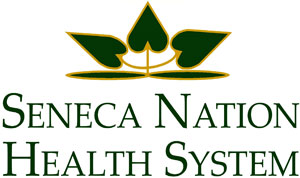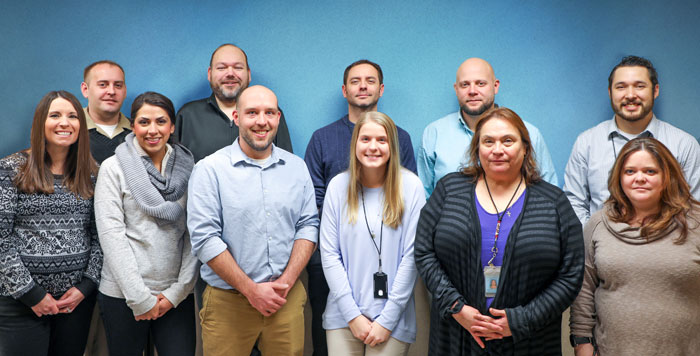Seneca Strong's Certified Addiction Recovery Coaches
- Need: The Seneca Nation of Indians has experienced disproportionate rates of opioid, alcohol, and substance misuse.
- Intervention: The Seneca Nation Government and Executives founded Seneca Strong, a recovery peer advocate program, with the goal of reducing substance misuse across the Nation.
- Results: Seneca Strong has since grown in personnel and capacity to meet the needs of the Allegany and Cattaraugus territories of the Seneca Nation.
Description
The Allegany and Cattaraugus territories in Western New York are home to roughly half of the tribal members of the Seneca Nation. The Seneca Nation has experienced disproportionate rates of opioid, alcohol, and substance misuse. Collectively, the Seneca Nation decided to prioritize prevention, intervention, and treatment of substance misuse across both territories.
In 2014, Seneca Strong was founded by the Seneca Nation's Council and Executives to address the gap in opioid treatment and increase prevention and awareness efforts. The program enables Certified Addiction Recovery Coaches (CARC) to guide community members who have substance or opioid dependency disorder through recovery. Seneca Strong uses innovative and strengths-based intervention approaches that support both individuals and families.

Seneca Strong operates within the Seneca Nation Health System (SNHS). Healthcare providers within SNHS refer patients with a substance or opioid use disorder to one of 4 Certified Addiction Recovery Coaches employed by the Health System. Currently, there are 2 additional Peer Recovery Advocates in the process of becoming certified. These advocates have also struggled with substance dependency, are currently in recovery, or have been affected by addiction in their lives. By walking the client through a sequential program, the advocates' experiences often resonate with their clients and provide a positive example of overcoming dependency.
Seneca Strong coordinates with Behavioral Health Counselors employed by the SNHS who are Licensed Master Social Workers (LMSW), Licensed Certified Social Workers (LCSW or LCSW-R), Licensed Mental Health Counselors (LMHC), or Certified Addiction Substance Abuse Counselors (CASAC).
 Referrals to the
Seneca Strong program are most often related to legal
concerns. The substance abuse referrals coming to the
SNHS Behavioral Health Unit can be from law enforcement,
court systems (i.e. Peacemakers Court, drug court,
local/county court, or family court), as well as other
New York hospitals and social service agencies.
Meaningful partnerships, described below, have also
formed as a result of this program.
Referrals to the
Seneca Strong program are most often related to legal
concerns. The substance abuse referrals coming to the
SNHS Behavioral Health Unit can be from law enforcement,
court systems (i.e. Peacemakers Court, drug court,
local/county court, or family court), as well as other
New York hospitals and social service agencies.
Meaningful partnerships, described below, have also
formed as a result of this program.
- By working with the court system and the Cattaraugus County Probation Department, Seneca Strong accepts individuals who are on probation or who may have legal concerns. A probation officer collaborates with the client's peers to better serve the individual.
- Seneca Strong has partnered with Seneca Nation's Peacemaker's Court in the implementation of the Comprehensive Opioid Abuse Program (COAP) grant administered by the Bureau of Justice Assistance. Seneca Nation is one of the first tribal organizations to be awarded this grant. Seneca Strong's Outreach Case Managers work in conjunction with legal entities, the SNHS Behavioral Health Unit, and Peacemaker's Court to provide assistance, navigate resources and identify any gaps in services. This grant is ending in September 2022. The SNHS Behavioral Health Unit and Seneca Strong have applied for the 2022 COSSAP grant to continue to provide services to those struggling with addiction and legal concerns.
The program is funded through the Seneca Nation's general fund, with additional support from the Tribal Opioid Response grant and SNHS.
Services offered
Seneca Strong emphasizes the following aspects that help Seneca people build resiliency:
- Holistic healing and forgiveness over punitive action
- Incorporating prevention and sobriety programming into traditional practices
- Building relationships with law enforcement to help direct Seneca members struggling with drugs and alcohol into recovery services, rather than jails
The program provides team-based care catered to each client in the following ways:
Outreach & Engagement
- Identifies and addresses trauma and addiction through Behavioral Health Unit providers
- Gathers information from each referral source to better understand the client's background
- In collaboration with partner programs, Seneca Strong offers cultural and holistic classes, job readiness assistance, wellness classes, and substance misuse support and guidance.
- Connects the client to health and social services,
including:
- Treatment
- Recovery services
- Sober housing
- Social networks
- Advocacy groups
- Education
- Employment
Healthcare Services
- Keeps communication lines open with SNHS's medical, behavioral health, and other services so that clients can receive assistance and full-spectrum health care services as needed
- To treat opioid dependency, Medication-Assisted Treatment (MAT) is provided through the Behavioral Health Unit and VIVITROL is provided by Seneca Nation Health System medical providers.
- Connects clients to follow-up treatment when they are ready to be released from the in-patient program
Recovery Services
- Peer mentoring and coaching
- Creates goals with client and assists with achieving them
- Assists clients in finding apartments, transportation, child care, and employment
- Offers cultural programming such as sweat lodges, talking circles, Reiki, sound baths, and meditation
- Facilitates, transports and/or attends the following
recovery services with clients:
- 12-step Wellbriety or sobriety groups, Narcotics Anonymous (NA), and Alcoholics Anonymous (AA)
- Monthly sobriety dinners for program participants that were halted during the COVID-19 pandemic, but are being re-established
- A drop-in support center at both Cattaraugus and Allegany SNHS sites
SNHS has 5 departments that work closely together to holistically meet the needs of community members. These departments are the Behavioral Health Unit, Seneca Strong, Prevention, Child and Family Services, and the Care Collaboration Unit.

The New York Certification Board (NYCB) of the Alcoholism and Substance Abuse Providers of New York State (ASAP) requires 60 total hours of NYCB-approved training in the following areas in order for peer advocates to become Certified Addiction Recovery Coaches:
- 16 hours of training in Recovery from Addiction
- 20 hours of training in Recovery Coaching
- 5 hours of training in Recovery Education
- 4 hours of training in Medication Assisted Treatment
- 15 hours of training in Ethical Responsibility
Results
Since the start of the program, people have been supported through their recovery by Seneca Strong and SNHS BHU.
Challenges
Because peer advocates have close interaction with clients, maintaining professional boundaries while on-call continues to be a challenge. Trainings and professional development opportunities are provided to help equip peer advocates with the skills they need to succeed in these roles and better serve clients.
Replication
Tools used in peer recovery specialist training include the New York Office of Addiction Services and Supports (OASAS) Level of Care Determination tool, which is used by BHU to help assess the level of care needed for treatment.
Contact Information
Tammie DeYoe, Behavioral and Community Services DirectorSeneca Nation Health System
716.945.5894
Topics
Behavioral health
· Behavioral health workforce
· Criminal justice system
· Culture
· Employment and unemployment
· Substance use and misuse
· Tribal communities
States served
New York
Date added
June 26, 2019
Suggested citation: Rural Health Information Hub, 2022 . Seneca Strong's Certified Addiction Recovery Coaches [online]. Rural Health Information Hub. Available at: https://www.ruralhealthinfo.org/project-examples/1062 [Accessed 28 February 2026]
Please contact the models and innovations contact directly for the most complete and current information about this program. Summaries of models and innovations are provided by RHIhub for your convenience. The programs described are not endorsed by RHIhub or by the Federal Office of Rural Health Policy. Each rural community should consider whether a particular project or approach is a good match for their community’s needs and capacity. While it is sometimes possible to adapt program components to match your resources, keep in mind that changes to the program design may impact results.
